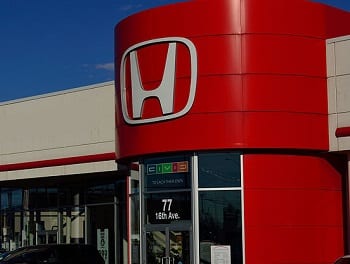Honda to showcase its new hydrogen fuel cell vehicle in Geneva
February 11, 2016Clarity Fuel Cell vehicle to be shown off at the 2016 Geneva Motor Show
Japanese automaker Honda has plans to debut its new fuel cell vehicle in Europe at the 2016 Geneva Motor Show. The company was among the first to introduce a fuel cell vehicle to the market several years ago, though its original vehicle was only available for lease in California. The new Clarity Fuel Cell vehicle was first showcased at the 2015 Tokyo Motor Show, where it received strong praise due to the technology that it uses and its performance capabilities.
Vehicle runs off electricity produced by the consumption of hydrogen
The Clarity Fuel Cell is equipped, as the name suggests, with a hydrogen fuel cell. The fuel cell consumes hydrogen and produces electricity, with the byproduct of this process being oxygen and water vapor. This makes the vehicle environmentally friendly, as it does not produce any harmful emissions. This is one of the reasons fuel cells have become so popular in the auto industry, but these energy systems are also highly efficient and do not sacrifice performance in order to secure environmental friendliness.
New fuel cell vehicle can travel 430 miles on a single tank of fuel
 Honda’s new fuel cell vehicle is estimated to travel more than 430 miles before needing to refuel. This is considerably higher than many conventional battery electrics, making the fuel cell vehicle more attractive to consumers that travel frequently. Whereas battery electrics take several hours to fully charge, fuel cell vehicles can be fueled in a matter of minutes, introducing a degree of convenience to the clean transportation space.
Honda’s new fuel cell vehicle is estimated to travel more than 430 miles before needing to refuel. This is considerably higher than many conventional battery electrics, making the fuel cell vehicle more attractive to consumers that travel frequently. Whereas battery electrics take several hours to fully charge, fuel cell vehicles can be fueled in a matter of minutes, introducing a degree of convenience to the clean transportation space.
Auto industry is showing strong support for fuel cell technology
Honda is not the only company that is showing off its fuel cell vehicles, of course. Both Toyota and Hyundai are also promoting their new vehicles, which are equipped with hydrogen fuel cells. These vehicles are already available in several markets, but adoption among consumers has been relatively slow. This is partly due to the high cost of fuel cells, but also the lack of a comprehensive hydrogen fuel infrastructure in prominent markets.

 HFN News is your leading source for fresh hydrogen and renewable energy updates. Amid the fast-paced growth of hydrogen companies, we provide top-notch news and insights about this exciting sector. Our coverage spans from hydrogen cars to global sustainable initiatives, and we highlight the latest in green jobs and developing hydrogen hubs. We invite you to share your local hydrogen news and explore today’s renewable energy job listings on our site. Thanks for choosing HFN News as your trusted guide to the hydrogen and renewable energy world!
HFN News is your leading source for fresh hydrogen and renewable energy updates. Amid the fast-paced growth of hydrogen companies, we provide top-notch news and insights about this exciting sector. Our coverage spans from hydrogen cars to global sustainable initiatives, and we highlight the latest in green jobs and developing hydrogen hubs. We invite you to share your local hydrogen news and explore today’s renewable energy job listings on our site. Thanks for choosing HFN News as your trusted guide to the hydrogen and renewable energy world!